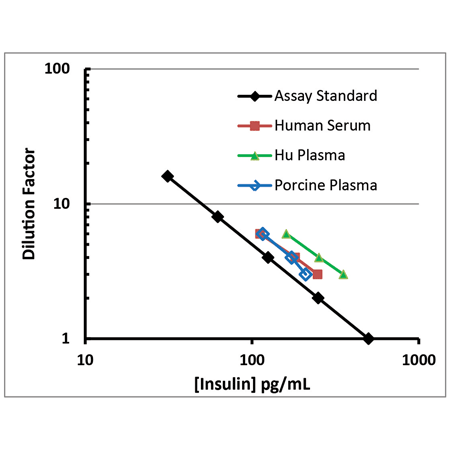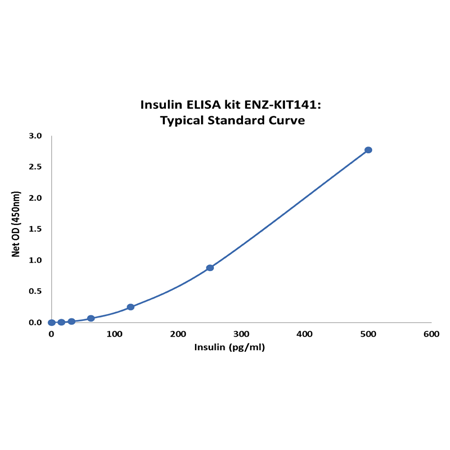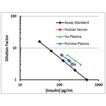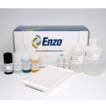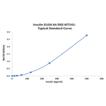- Highly sensitive measurement of insulin, detecting as little as 15.5 pg/mL
- Negligible cross reactivity with proinsulin
- High throughput format with results in 3 hours for up to 40 samples in duplicate
- Fully quantitative results that surpass semi-quantitative Western blot analysis
The Insulin ELISA kit is a colorimetric immunometric immunoassay kit with results in 3 hours.
Please mouse over
Product Details
| Sensitivity: | 15.5 pg/ml (15.6-500 pg/ml) |
| |
| Assay Time: | 3 hours |
| |
| Applications: | ELISA, Colorimetric detection
|
| |
| Application Notes: | For the quantitative determination of insulin in serum, plasma, and tissue culture media. |
| |
| Wavelength: | 450 nm |
| |
| Species reactivity: | Human
Porcine
|
| |
| Crossreactivity: | No cross-reactivity to similar family molecules (proinsulin). |
| |
| Shipping: | Blue Ice |
| |
| Long Term Storage: | +4°C |
| |
| Contents: | Microtiter plate, Assay Buffer 13, Standard, Wash Buffer Concentrate, Antibody, Conjugate, Substrate, and Stop Solution |
| |
| Scientific Background: | Insulin is peptide hormone made in the pancreas by beta cells. It promotes the uptake of glucose from the blood into tissues where it is stored in the form of glycogen and fat. Insulin also inhibits the production of glucose by the liver. By controlling glucose levels, insulin serves as the central regulator of fat and carbohydrate metabolism. The disease diabetes mellitus results when control of glucose levels is lost due to lack of insulin production (type 1 diabetes) or when sufferers develop an inability to respond to insulin (type 2 diabetes). Understanding a patient's insulin level helps to differentiate which form or diabetes may be present in patients presenting with diabetic symptoms.
Insulin immunoassays assist in identifying insulin resistance in type 2 diabetics and can indicate when insulin supplementation may be necessary in addition to oral medications. Insulin resistance has been linked to a variety of disease states including kidney damage and metabolic syndrome. Insulin immunoassays also help diagnose the presence of an insulin-producing tumor in the islet cells of the pancreas (insulinoma) and can also help determine the cause of low blood glucose (hypoglycemia). Beyond insulin's ability to induce widespread systemic effects, recent studies have demonstrated more localized insulin signaling with impacts on stem cell proliferation. |
| |
| UniProt ID: | P01308 |
| |
| Regulatory Status: | RUO - Research Use Only |
| |
| Compatibility: | This product is compatible with the Absorbance 96 Plate Reader.
 |
| |
Product Literature References
CD147 Levels in Blood and Adipose Tissues Correlate with Vascular Dysfunction in Obese Diabetic Adults: M.M. Ali, et al.; J. Cardiovasc. Dev. Dis.
9, 7 (2022),
Abstract;
Combined intermittent and sustained hypoxia is a novel and deleterious cardio-metabolic phenotype: X. Zhen, et al.; Sleep
45, zsab290 (2022),
Abstract;
Dietary lysine affects amino acid metabolism and growth performance, which may not involve the GH/IGF-1 axis, in young growing pigs: M. Shamimul Hasan, et al.; J. Anim. Sci.
98, skaa004 (2020),
Application(s): Pig plasma,
Abstract;
Hyperhomocysteinemia and Low Folate and Vitamin B12 Are Associated with Vascular Dysfunction and Impaired Nitric Oxide Sensitivity in Morbidly Obese Patients: M. Haloul, et al.; Nutrients
12, 2014 (2020),
Application(s): Human plasma,
Abstract;
Full Text
Related Products




